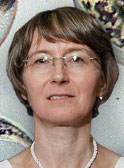Lilianna Solnica-Krezel, Ph.D., has been chosen to head the Department of Developmental Biology at Washington University School of Medicine in St. Louis.

Larry J. Shapiro, M.D., executive vice chancellor for medical affairs and dean of the School of Medicine, announced the appointment, effective Jan.1, 2010.
“Lila is a visionary scientist and outstanding leader who will reach across departments and schools to build the strongest possible developmental biology department,” Shapiro says. “I am confident that with her guidance, this department will continue to be at the forefront of research that is redefining how we think about human disease and how best to treat it.”
Solnica-Krezel comes to St. Louis from Vanderbilt University, where she is the University Professor and the Martha Rivers Ingram Professor of Developmental Genetics. She also is a professor of biological sciences, pediatrics and cell and developmental biology.
“I am honored by the invitation to head the new Department of Developmental Biology at Washington University, which has superb traditions in the area of developmental neurobiology and embryology,” Solnica-Krezel says. “It is a particularly opportune time for developmental biology research as recent technological breakthroughs in the animal model systems afford insights into human embryonic development. We are discovering that many of the adult human diseases have their origins during embryogenesis, while studies of stems cells and regeneration are bringing us closer to curing human diseases and pushing boundaries of aging. I am thrilled about joining the excellent group of developmental biologists at Washington University and working with them to shape the future of the department.”
The molecular biology and pharmacology department became the developmental biology department in 2007. The change reflected a shift in the department’s research focus. During the past 15 years, the department has recruited researchers interested in embryonic development, aging, regenerative biology and physiology. The department’s focus now encompasses an organism’s development through life — including the embryonic stage, the neonatal period and adulthood.
As head of the Department of Developmental Biology, Solnica-Krezel succeeds interim head David M. Ornitz, M.D., Ph.D., who has held the position since October 2004. Ornitz will return to his full-time research and teaching responsibilities.
“As an internationally regarded scientist and key member of the department for more than 17 years, David was the ideal person to guide the department through its renaming and its recent shift in focus,” said Shapiro. “He has done a tremendous job and has ensured the department’s success.”
Solnica-Krezel earned a master’s degree in molecular biology from Warsaw University in Poland in 1985 and a doctorate in oncology from the University of Wisconsin-Madison in the McArdle Laboratory for Cancer Research in 1991. She also completed a postdoctoral fellowship in developmental genetics in 1995 at Harvard Medical School, where she helped to initiate and carry out the first large-scale genetic screen for mutations affecting zebrafish embryonic development.
Solnica-Krezel studies the molecular and genetic mechanisms that control the early development of vertebrate animals. She has studied this process in zebrafish, using a combination of genetic analysis with embryological and molecular methods. She has received multiple research grants from the National Institutes of Health, March of Dimes Birth Defects Foundation and Human Frontier Science Program.
Solnica-Krezel is a member of the Society for Developmental Biology, American Society for Cell Biology, Genetic Society of America and the American Association for the Advancement of Science.
In 2005, she became a distinguished faculty member at Vanderbilt. She also previously was named a Pew Scholar in the Biomedical Sciences and received the Basil O’Connor Starter Scholar Award from the March of Dimes Birth Defects Foundation.
She is on the editorial and review boards of numerous scientific journals and serves as associate editor of Developmental Dynamics. She has published more than 74 articles on her research, contributed many book chapters and edited a book “Pattern formation in zebrafish.”
Washington University School of Medicine’s 2,100 employed and volunteer faculty physicians also are the medical staff of Barnes-Jewish and St. Louis Children’s hospitals. The School of Medicine is one of the leading medical research, teaching and patient care institutions in the nation, currently ranked third in the nation by U.S. News & World Report. Through its affiliations with Barnes-Jewish and St. Louis Children’s hospitals, the School of Medicine is linked to BJC HealthCare.